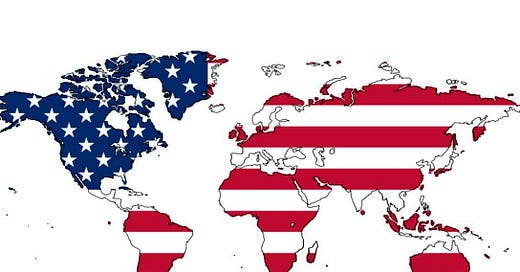America Is Not An Empire
But given America's strength, empire and hegemony are its only real options. The distinction matters.
by Rod D. Martin
October 22, 2011
The left and the libertarian portion of the right (a moniker they would strongly contest) agree on several things, but among the most significant is this: that America has become an empire.
Not all who espouse this position, of course, think that it is a bad thing. The brilliant Niall Ferguson actively argues for it, and says that much of what is wrong with the world can be traced to America's immaturity and unwillingness to accept and become comfortable with this, the role it has rightly inherited. (He also makes a pretty strong, albeit somewhat non-traditional, case for why America is and ought properly be understood as an empire.)
But the truth is quite the contrary. And today shows that truth better than most, in this headline from Britain's Guardian newspaper, "Iraq rejects US request to maintain bases after troop withdrawal".
Conquered Iraq...rejects? A US request? Why would an Imperial power have to request anything of its "subject" state, its "colony"? And wasn't that what the Iraq War was all about: colonizing ancient Babylon, the heart of the Fertile Crescent and Cradle of Civilization, for American ambition and glory, for American oil and American business and American power projection for a new American era of American dominance of the entire Middle East?
Oops, guess not.
Now some might inject at this point that the difference is the 2008 election, specifically, that George W. Bush or John McCain would have stayed in Iraq until the Second Coming, whereas Barack Obama "the Good" has acted differently. But this ignores reality. It was the Bush Administration that made democratic elections its first priority after Saddam's fall. It was George W. Bush who held three such elections in Iraq in the first 18 months of U.S. occupation; and it was George W. Bush who then duly negotiated with that barely-functioning government as an equal on matters no conquerer has ever negotiated. America was infinitely more heavy-handed in Germany, and ruled Japan as an Imperial Provence under the dictatorial authority of His Majesty Douglas MacArthur...until it negotiated a peace treaty and left in 1952. And indeed, it was George W. Bush who set the terms of this Iraqi withdrawal, by dictating that it would be the Iraqis, not the Americans, who decided the terms of any long-term basing -- or lack thereof -- after his time.
And note that we're just talking about military bases here. Where is all that oil we were supposedly taking from Iraq? Certainly not in American hands.
America is not an empire. It is a hegemon, and it should be. A hegemon, like ancient Athens, is a first-among-equals, a very powerful nation that nevertheless deals with its neighbors and allies as much as equals as circumstances will permit, respecting their sovereignty, their internal processes, the rights of their people. It functions together for the greater good of the whole, not simply of the center as does an empire.
One might think it better if the hegemonic power were weaker, if all the involved powers truly were more equal, but this is an exercise in creative fiction. Powers are what they are, and America is a hyperpower: one must take reality as it comes. So to be America's ally is to enter its hegemony, which has been of almost infinite good for almost all who have done it (a few notable exceptions, such as the Republic of China, South Vietnam and Cambodia leaping to mind, with the equal memory that what America committed to them was betrayed by one and precisely one American political party). But as France can attest (but won't), it does not involve becoming a province of empire.
Given America's strength, hegemony and empire are its only true options in foreign affairs. The British Ferguson, brilliant as he is, tries to shoehorn America into the British model; Pat Buchanan, rightly concerned that empire abroad would first mean tyranny at home, tries to warn of that imperial danger as well, as do assorted leftists and libertarians with various agendas. All overstate the case. America sometimes overreaches, but its core belief that one people should not rule over another for any great length of time, and that diffusion of power at home is the greatest bulwark of freedom and of all other American values, remains whole. Today's headline demonstrates that as well as anything we've seen in a long time.
Now, as to the massive diplomatic failure of our current abysmally incompetent, anti-American administration that the rejection of our bases represents...well, that's quite another story indeed.





